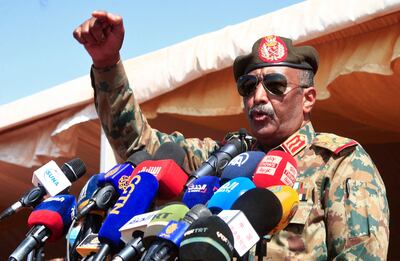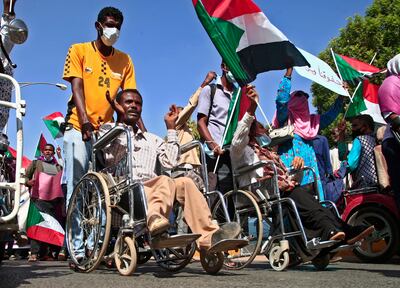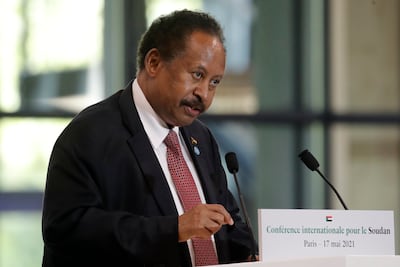Sudan’s military leader insisted his coup on October 25 was not a power grab but a badly needed “correction” to the country’s transition to democracy.
But Sudanese and foreign analysts say the country has become more polarised since the military takeover, with the democratic transition still derailed and anti-coup street protests continuing.
Gen Abdel Fattah Al Burhan, the army chief and coup leader, dismissed the civilian prime minister, Abdalla Hamdok, on the day of the coup but reinstated him four weeks later in a deal that energized opposition to the October takeover and gave street protests a second wind.
“This crisis is not over yet,” Volker Perthes, the UN envoy to Sudan, told the Security Council on Friday.
The deal to reinstate Mr Hamdok was ”far from perfect” and faces “significant opposition” from some Sudanese political factions and the large protest movement, he said.
“The Sudanese men’s and women’s unwavering commitment to realise civilian-led democratic governance cannot be overlooked.”
The powerful pro-democracy movement that once supported Mr Hamdok has dismissed the deal as a fig leaf for direct army rule.
At least 44 people have been killed and hundreds injured in protests since the coup, fuelling popular discontent and casting him as part of what activists call “the coup regime”.
Beyond Sudan’s borders, major western backers have been reluctant to accept Gen Al Burhan’s assurance of a democratic transition or his pledge to respect freedom of expression and assembly. They have yet to reverse a freeze on economic aid, worth hundreds of millions of dollars, imposed in response to the coup.
In a thinly veiled warning to the military, the US Congress on Thursday passed a resolution condemning the coup and advanced legislation to impose sanctions on anyone who undermines Sudan’s democratic transition.
Mr Hamdok has yet to form the government of independent technocrats he had promised nearly three weeks ago.
Meanwhile, he has replaced all acting state governors appointed by the military, according to a document seen by Reuters on Sunday. The decision is part of efforts by Mr Hamdok to roll back changes following the takeover.
Mr Hamdok's office confirmed the decision to Reuters.
But there is hope of at least a short-term solution to Sudan’s latest crisis, said Alex de Waal, a Sudan expert at Tufts University in Boston.
“The Sudanese have a way of making the best of a bad deal and finding a workable compromise,” he said. “But it usually comes at the cost of finding any long-term solutions.
“So, the outlook is pessimistic.”
The way forward will depend on Sudan’s three major players, and the options available to them.
Gen Abdel Fattah Al Burhan

Central to Gen Al Burhan’s narrative is that the military’s takeover was not a coup and that it is determined to protect Sudan’s democratic transition until elections are held in 2023.
He has said he will not run for office and that the military will quit politics after the vote. In the meantime, he has projected an image of the military as the ultimate defenders of the nation, making fiery nationalist speeches to troops in a border enclave claimed by both Sudan and Ethiopia and to service members at the end of war games.
In a recent television interview, Gen Burhan said he planned to follow the model of the late Abdel Rahman Sowar Al Dahab, the general who seized power in 1985 during mass protests against the authoritarian rule of Jaafar Nimeiri but returned it to an elected government the next year.
But given that generals have ruled Sudan for more than 50 of the 65 years since independence, Gen Al Burhan’s assurances are falling on deaf ears.
Sudanese political analyst
Analysts say he needs to make more concessions to the civilian component of the transitional administration or surrender some of the sweeping powers he has given himself since the coup, to convince sceptics that he will allow the democratic transition to succeed.
“The country’s political future appears deeply uncertain now and that can only be remedied if the two parties of the November 21 deal make concessions,” said Sudanese political analyst Al Sadeq Al Magali. “Trying to silence the streets through force will not work. A new understanding between all concerned parties must be reached, but with a long-term perspective.”
Observers say Gen Al Burhan is not the only one calling the shots inside the military, and that this could mean he is under pressure from other top officers not to loosen the military’s longtime grip on power.
“There will likely be another military coup against Al Burhan if he makes too many concessions or makes good on his promise to take the military entirely out of politics,” said an Arab diplomat who recently completed a two-year posting to Khartoum. “In Sudan, the military will never entirely leave politics. They view their political role as a given right.”

The pro-democracy movement
The three major groups in Sudan’s pro-democracy movement are the Forces for Freedom and Change, the Sudanese Professionals’ Association and local resistance committees.
All three were at the heart of the street protests against former president Omar Al Bashir that swept Sudan, in 2018 and 2019, in what is known as the “December Revolution”. The protests forced the military to remove Al Bashir in April 2019.
The FFC went on to become the popular base and political patron of Mr Hamdok’s civilian-led government following a power-sharing deal with the military.
After the takeover, Gen Al Burhan repealed the parts of the deal pertaining to the FFC’s role in the transitional administration and replaced its representatives on the ruling Sovereign Council with obscure civilians, declaring himself the country’s de facto leader.
For the FFC, the SPA and the resistance committees, the November 21 deal enshrined military rule and turned Mr Hamdok into a toothless politician beholden to the generals.
They reject any political role for the military and demand that Gen Al Burhan and his associates stand trial for the deaths of anti-coup protesters and overthrowing a constitutional government. They plan to hold six more rallies this month.
Internal divisions in the FFC have often stopped it from speaking with one voice. Moreover, FFC-linked party politicians broke ranks with the rest of the movement and mediated the deal between Mr Hamdok and the military.
But the pro-democracy movement does not go far beyond removing the military from politics, Mr de Waal said. “They’ve also miscalculated the politics of rural Sudan, allowing the military to make inroads into the provincial power structures.”
Abdalla Hamdok

When Mr Hamdok took office as prime minister in August 2019, becoming the top civilian in a somewhat awkward transitional partnership with the military, he was hailed by the FFC as the people’s choice. Two years later, the UK-educated economist has been dismissed as a “traitor” by the people who propelled him to power.
Mr Hamdok says he accepted the deal with the military because he wanted to spare Sudan more bloodshed and to protect the gains made by his economic reforms. He said the deal, which secured the release of all political prisoners held since October 25, had saved Sudan from chaos.
He has tried to assure the Sudanese that his authority and independence as head of the executive branch are beyond question, and says consultations are under way to create a broader and more inclusive version of the November 21 deal.
“There is no one more concerned with a smooth transition to democratic rule than Hamdok,” said Khaled Al Oaysar, a political analyst known to be close to the prime minister.










